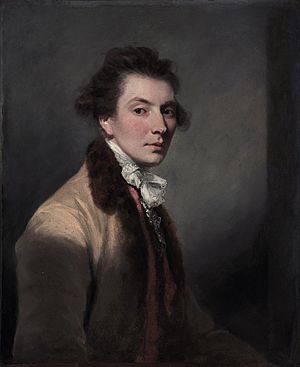Luke Gardiner, 1st Viscount Mountjoy facts for kids
Quick facts for kids
Luke Gardiner
|
|
|---|---|

Luke Gardiner, 1st Viscount Mountjoy
|
|
| Born | 7 February 1745 |
| Died | 5 June 1798 (aged 53) |
| Resting place | Dublin, Ireland |
| Occupation | Irish Landowner and Politician |
| Known for | Developer of Mountjoy Square and Gardiner Street |
| Parent(s) | Charles Gardiner |
| Relatives | Luke Gardiner (grandfather) |
Luke Gardiner, 1st Viscount Mountjoy (born February 7, 1745 – died June 5, 1798) was an important Irish landowner and politician. He owned a lot of land and helped make laws for Ireland.
Early Life and Family
Luke Gardiner was born in Dublin, Ireland. His father was Charles Gardiner. His mother was Florinda Norman. Luke had a sister named Anne. She later became the Countess of Clancarty.
In 1773, Luke Gardiner married Elizabeth Montgomery. Her father, William Montgomery, was also a politician. Luke and Elizabeth had a son named Charles John. They also had a daughter named Margaret. Luke Gardiner went to college at St John's College, Cambridge in England.
A Career in Politics
Luke Gardiner was a member of the Irish House of Commons. This was like the parliament or law-making body in Ireland at the time. He represented County Dublin from 1773 to 1789. This means people from County Dublin chose him to speak for them.
In 1780, he joined the Irish Privy Council. This was a group of important advisors to the King in Ireland. Later, he was given special titles. In 1789, he became Baron Mountjoy. Then, in 1795, he became Viscount Mountjoy. These titles were part of the Peerage of Ireland. This meant he was a nobleman.
Developer of Dublin
Luke Gardiner was known for developing parts of Dublin. He helped plan and build new areas. Two famous places he helped create are Mountjoy Square and Gardiner Street. These are still important parts of Dublin today.
His Final Battle
Luke Gardiner, the 1st Viscount Mountjoy, died in 1798. He was 53 years old. He was leading his soldiers in a battle called the Battle of New Ross. He was killed during the fighting.
After his death, his son Charles took over his titles. Charles later became the Earl of Blessington.
 | Claudette Colvin |
 | Myrlie Evers-Williams |
 | Alberta Odell Jones |

